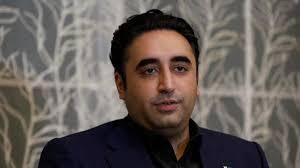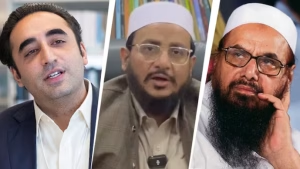New Delhi – The recent statement by former Pakistani Foreign Minister Bilawal Bhutto Zardari regarding the potential extradition of terrorists to India has created a significant diplomatic and political controversy. The Bilawal Bhutto Hafiz Saeed extradition proposal has drawn sharp criticism from within Pakistan, particularly from the families of those targeted terrorists, highlighting the complex dynamics of Pakistan’s counter-terrorism policies and India-Pakistan relations.
Bilawal Bhutto’s Controversial Statement

In a recent interview, Bilawal Bhutto Hafiz Saeed discussions emerged when the Pakistan People’s Party chairman stated that his country had no objection to extraditing terrorists like Hafiz Saeed and Masood Azhar to India as confidence-building measures. This Bilawal Bhutto Hafiz Saeed proposal represents a significant shift in Pakistan’s traditional stance on handling internationally wanted terrorists operating from its territory.
The Bilawal Bhutto Hafiz Saeed extradition statement came in response to questions about potential concessions and good-faith gestures toward India. Bilawal emphasized that Pakistan was ready to extradite “individuals of concern” to India, provided New Delhi showed what he termed “willingness” to cooperate in the extradition process. This conditional approach in the Bilawal Bhutto Hafiz Saeed matter reflects Pakistan’s attempt to balance domestic pressures with international diplomatic requirements.
Background of the Terrorist Leaders


The Bilawal Bhutto Hafiz Saeed controversy centers around two of South Asia’s most notorious terrorist leaders. Hafiz Saeed, the chief of Lashkar-e-Taiba (LeT), is the mastermind behind the 26/11 Mumbai terror attacks that killed 166 people and wounded over 300 others. Currently serving a 33-year sentence for terror financing, Saeed remains one of India’s most wanted terrorists despite his imprisonment in Pakistan.
Also Read: PM Modi In BRICS Summit 2025 Calls for Terror Sanctions
Masood Azhar, the other figure mentioned in the Bilawal Bhutto Hafiz Saeed discussions, leads Jaish-e-Mohammad (JeM) and has been designated as a global terrorist by the United Nations. His terrorist activities include orchestrating the 2001 Parliament attack, involvement in the 26/11 Mumbai attacks, the 2016 Pathankot airbase assault, and the devastating 2019 Pulwama suicide bombing that killed 40 Indian security personnel.
Pakistan’s Legal Position and Challenges
The Bilawal Bhutto Hafiz Saeed extradition proposal reveals the complex legal landscape Pakistan faces regarding these terrorist leaders. Both LeT and JeM have been officially banned by Pakistan’s National Counter Terrorism Authority (Nacta), yet these organizations continue to operate with apparent impunity. The Bilawal Bhutto Hafiz Saeed case highlights this contradiction, as Pakistan has prosecuted these individuals only for domestic charges like terror financing rather than cross-border terrorism.
Bilawal claimed that prosecuting Hafiz Saeed and Masood Azhar for cross-border terrorism was difficult due to what he characterized as “noncompliance” from India. In the Bilawal Bhutto Hafiz Saeed context, he argued that India must provide evidence within Pakistani courts and send witnesses to testify, suggesting that New Delhi’s reluctance to engage in this process hampers successful prosecution.
India’s Counter-Terrorism Approach


The Bilawal Bhutto Hafiz Saeed discussions also touched upon India’s approach to pursuing terrorists, which Bilawal described as a “new abnormal.” He argued that India’s vow to pursue terrorists across borders does not serve the interests of either Pakistan or India, revealing Pakistan’s discomfort with India’s more aggressive counter-terrorism stance following major attacks.
This aspect of the Bilawal Bhutto Hafiz Saeed controversy underscores the fundamental disagreement between the two countries on how to handle cross-border terrorism. While India maintains that Pakistan provides safe haven to terrorists, Pakistan argues that it faces legal and procedural challenges in prosecuting these individuals for crimes committed outside its territory.
Current Status of the Terrorists
Addressing questions about the whereabouts of these terrorist leaders, the Bilawal Bhutto Hafiz Saeed discussion revealed Pakistan’s official position on their custody. Bilawal stated that Hafiz Saeed is currently incarcerated and not a free man, contradicting widespread reports about the relatively comfortable conditions of his imprisonment and continued influence over his organization.
Regarding Masood Azhar, the Bilawal Bhutto Hafiz Saeed interview revealed that Pakistan believes the JeM chief is in Afghanistan. Bilawal claimed that Pakistan had been unable to arrest Masood Azhar and would be “more than happy” to arrest him if India shared information proving his presence on Pakistani soil.
Family Opposition and Backlash

The Bilawal Bhutto Hafiz Saeed extradition proposal immediately drew fierce opposition from within Pakistan, particularly from the families of the targeted terrorists. Talha Saeed, Hafiz Saeed’s son and himself a designated global terrorist, angrily condemned Bilawal’s statement, claiming it brought disgrace to Pakistan globally.
Talha Saeed’s response to the Bilawal Bhutto Hafiz Saeed proposal highlights the domestic political challenges Pakistan faces in dealing with terrorist leaders who maintain significant support bases within the country. His vehement opposition, along with that of other family members, demonstrates the entrenched nature of terrorist networks in Pakistan’s social and political fabric.
Diplomatic Implications
The Bilawal Bhutto Hafiz Saeed extradition proposal carries significant diplomatic implications for India-Pakistan relations. While it represents a potentially positive development in bilateral cooperation against terrorism, the conditional nature of the offer and the immediate backlash from terrorist families raise questions about Pakistan’s genuine commitment to such measures.
The Bilawal Bhutto Hafiz Saeed controversy also reflects broader challenges in South Asian counter-terrorism cooperation. Despite international pressure and bilateral agreements, the practical implementation of anti-terrorism measures remains complicated by domestic political considerations, legal procedures, and the continued influence of terrorist organizations.
Future Prospects and Challenges
The Bilawal Bhutto Hafiz Saeed extradition discussion opens new possibilities for India-Pakistan cooperation on counter-terrorism, but significant obstacles remain. Pakistan’s demand for Indian cooperation in legal proceedings, combined with domestic opposition from terrorist sympathizers, creates a complex environment for implementing such proposals.
The outcome of the Bilawal Bhutto Hafiz Saeed controversy will likely influence future diplomatic initiatives between India and Pakistan. Success in extraditing these high-profile terrorists could establish precedents for broader cooperation, while failure might reinforce mutual distrust and skepticism about each other’s commitment to fighting terrorism.
The international community’s response to this Bilawal Bhutto Hafiz Saeed proposal will also be crucial in determining whether Pakistan follows through on its stated willingness to extradite terrorists or whether domestic political pressures and legal complications prevent meaningful action in addressing cross-border terrorism challenges.

